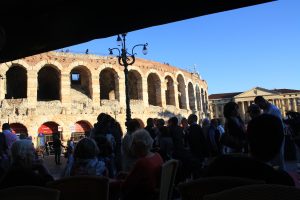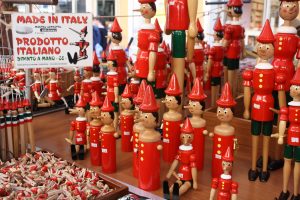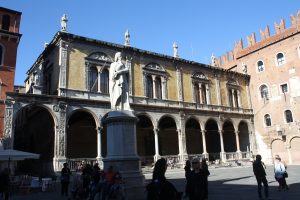You’re planning a vacation in northern Italy. And you’ll certainly want to spend some time in Venice. Lucky you. As a wine lover, you’d like to do some wine tasting. Right around Venice are Soave and Venetzia-Friuli, both famous for their white wines. Oh, but you wanted to taste some major league red wines? In that case, you can drive about an hour and a half west and you’ll be in Valpolicella, where you can sip Amarone to your heart’s content. We’d like to suggest that you take more than a day trip and enjoy the pleasures of the main city of Valpolicella, Verona.
It’s an ancient city, as evidenced most of all by the magnificently intact Roman stadium on the grandest of Verona’s wide plazas, the Piazza Bra. They still stage an opera festival there every summer. Even if you can’t get a ticket, it is quite a pleasure sitting in sidewalk caffe on the piazza, sipping a cappuccino and admiring the stadium and other grand buildings of a more modern era.
The ancient Roman Arena on the Piazza Bra.
In fact, Verona is a city of many wonderful piazzas, much like Venice. The Piazza d’Erbe was the herb market in the Middle Ages. Today it is lined with restaurants, all with tables in the open air. The middle of the square is full of carts selling all sorts of touristy items, most importantly little puppets of Pinocchio, a famous local resident of the past.
In many ways, the Piazza d’Erbe is best appreciated at night, when the Renaissance buildings and towers are lit up. It’s a dramatic backdrop for a bowl of spaghetti or big fat pici, the locally popular pasta. (A word of warning about the food in Verona: horse and donkey meat are very popular there. So if you see cavallo or asino on the menu, think twice.)
Just beyond the Piazza d’Erbe is the Piazza Seignoria, with a large statue of Dante looming over it. He was a Florentine, but was exiled there for his political views and settled in Verona. The Veronese adopted him quite readily. In those days, Verona was a possession of the Venetians so anyone that Florence was against, Venice was for.
Piazza Seignoria, with its statue of Dante.
Verona has a special place in the hearts of lovers of Shakespeare’s plays. For one thing, there were the Two Gentlemen of Verona. And then there was a notorious feud between two Veronese families, the Montecchi and the Capeletti. You may know them as the Montagues and the Capulets. Today you can visit Juliet’s balcony, where single women have taken to leaving little messages on the wall asking Ms. Capulet to help them find a lover as true as Mr. Montague. In fact, you can have dinner in a restaurant in Romeo’s house.
As you wander through Verona’s medieval and Renaissance section, you will find a high gate with a clock in it, that turns an ordinary street into a special place. At its base is a bust of Shakespeare with this inscription in both English and Italian:
“There is no world without Verona’s walls, but purgatory, torture, hell itself. Hence, banished is banish’d from the world, and world’s exile is death.” Romeo and Juliet, Act III, Scene III


